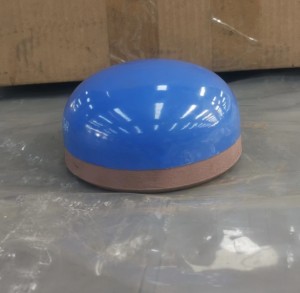Anti-corrosion end caps, also known as antimicrobial end caps, are an important component in preventing corrosion in a variety of industrial applications. Understanding how it works is critical to maintaining the integrity and longevity of equipment and infrastructure. In this blog, we’ll take a closer look at how anti-corrosion end caps work and their role in fighting corrosion.
Corrosion is a natural process that occurs when metal is exposed to oxygen and moisture, causing rust and material deterioration. This can be a serious problem in industrial environments where metal parts are often exposed to harsh environmental conditions. The function of anti-corrosion end caps is to form a protective barrier that prevents moisture and oxygen from coming into contact with the metal surface, thereby inhibiting the corrosion process.

The key to the effectiveness of antimicrobial end caps lies in the materials used in their construction. These end caps are typically made from high-quality, corrosion-resistant materials such as plastic or rubber that can withstand harsh conditions. The design of the end caps also plays a vital role in their effectiveness, as they are designed to provide a secure, tight seal around the metal components, preventing the entry of any potential corrosive agents.
One of the primary mechanisms by which antimicrobial end caps work is through the process of elimination. By isolating the metal surface from the outside environment, these end caps effectively cut off the supply of oxygen and moisture, which are critical for the corrosion process to occur. This isolation of metal surfaces significantly slows or even eliminates the occurrence of corrosion, thereby extending the life of the equipment or infrastructure.
In addition to exclusion, antimicrobial end caps may also incorporate corrosion-inhibiting compounds or agents into their structure. These compounds are designed to actively fight corrosion by forming a protective layer on the metal surface, thereby preventing rust and deterioration. This combination of exclusion and active corrosion inhibition makes anti-corrosion end caps a highly effective solution for combating corrosion in industrial applications.
Additionally, installing corrosion-resistant end caps is a simple and cost-effective way to protect metal components from corrosion. These end caps are easily installed onto the ends of pipes, tubes and other metal structures, providing a reliable and long-lasting barrier against corrosion. This ease of installation makes anti-corrosion end caps an attractive option for industries looking to protect their assets and infrastructure from corrosion damage.
In summary, anti-corrosion end caps play a vital role in preventing corrosion in industrial applications. By forming a protective barrier and incorporating anti-corrosion compounds, these end caps effectively combat the harmful effects of rust and deterioration. With their simple installation and long-lasting protection, anti-corrosion end caps are valuable assets in the fight against corrosion, ensuring the integrity and longevity of metal components across industries.
Post time: Mar-08-2024



